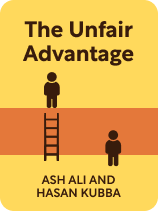

This article is an excerpt from the Shortform book guide to "The Unfair Advantage" by Ash Ali and Hasan Kubba. Shortform has the world's best summaries and analyses of books you should be reading.
Like this article? Sign up for a free trial here .
What’s a lifestyle startup? Is it the right kind of business for you?
Entrepreneurs Ash Ali and Hasan Kubba explain what lifestyle startups are and why they’re usually self-funded. They offer a bit of insight into what it takes to make this type of business profitable. We include some pros and cons of small business ownership to help you know what kind of business is right for you.
Continue reading to learn the basics of lifestyle startups.
Lifestyle Startups
Lifestyle startups are local small businesses that provide founders with a sustainable income. Some have physical locations while others are online. Lifestyle startups generally provide services or products that target a relatively small customer base and are thus hard to scale. Examples include a specialty tea shop, a virtual dance academy, an auto repair shop, and a mobile dog washing business.
Lifestyle startups are almost always self-funded and have limited appeal for external investors. Why? As Ali and Kubba explain, the aim in lifestyle startups is to turn a profit quickly, not dominate a whole industry as investors aim to do when they put their money behind a startup. While lifestyle startups can be highly lucrative and usually provide a comfortable life for their founders, profits are generally more modest. If you choose this type of startup, the authors say, you’ll have to work extremely hard to achieve success, but you should be able to create a work schedule that affords you some degree of freedom once you get some traction.
| The Good and Bad of Small Business Ownership Despite the limited scope and scale of lifestyle startups, many entrepreneurs choose this option. Statistics show there are 32.5 million small businesses in the US, accounting for 99.9% of all US businesses. Small businesses form an integral part of the US economy, creating 1.5 million jobs annually and offering job opportunities as well as a plethora of unique products and services. Why are so many founders willing to take the risk of starting their own business? According to research, freedom and passion—not money—are the main motivators. Nearly two-thirds of small business owners say they started their businesses to be their own boss and to create something from the ground up. Only 8% say money was their motivator. Although lifestyle startups can provide owners with a sustainable income, as Ali and Kubba say, the average small business owner salary is a modest $62,000 per year, and many company founders take no salary in the first years of running their business. Also, as the authors note, the demands of small business ownership are extremely high. According to research, small business owners work twice as much as regular employees, with 39% working over 60 hours a week. Nevertheless, the appeal of this career option doesn’t seem to be waning. Studies show that 66% of millennials have a career goal of starting their own business, and 70% of current small business owners say owning a business is the best job they’ve ever had. |

———End of Preview———
Like what you just read? Read the rest of the world's best book summary and analysis of Ash Ali and Hasan Kubba's "The Unfair Advantage" at Shortform .
Here's what you'll find in our full The Unfair Advantage summary :
- The guidebook you need if you're planning to start a business
- How to find and use your unfair advantages (everybody has some)
- The steps you must take to achieve startup success






